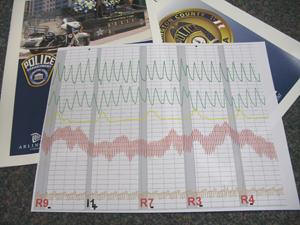 |
|
Police Polygraph Examiner Tries to Be Firm, But Fairby KRISTEN ARMSTRONG, Staff Writer |
|
| Robert Icolari has the power
to tell whether people are being truthful, experiencing anxiety or
feeling relaxed. Is he a mind-reader or a psychic? Hardly - he's the senior polygraph examiner for the Arlington County Police Department. Icolari and three other examiners conduct all polygraph sessions for suspects in criminal cases, and for all the new hires and applicants to the department. The Newark, N.J., native entered the polygraph field after two decades in the U.S. Marine Corps. “I'm always intrigued in talking to people and seeing why they do the things they do,” Icolari said in a recent interview, explaining his interest in the job. All polygraph examiners must be certified, and Icolari attended the Maryland Institute for Criminal Justice in Millersville, Md., to earn his certification. He has been a member of the Arlington police force since 1992. “That's the joy of this [job]. There's no typical day. Sometimes people are waiting with baited breath for me to come in. Other times, no one is waiting,” Icolari said. There's no average number of polygraph tests administered during any particular period, he said. “It depends on the needs of the detectives here in the criminal division.” Some weeks, Icolari spends more of his time on his other assigned responsibilities, such as investigating cases in the auto unit. Other weeks Icolari has five tests to run, and stays at the department until past 8 p.m. The instrumentation phase of the test (when the suspect sits in a chair and is monitored with sensors) actually does not take very long, ranging between 30 to 45 minutes. Those taking the exam are hooked to a chair that delivers information on blood pressure, electrodermal responses, respiration and movement to a computer, which tracks any changes during the interview. When suspects are asked something they might not want to answer, their body reacts in what examiners call the “three F's”: fight, flight or freeze. For Jasmine Senn and other Arlington police recruits, a polygraph is a mandatory part of becoming a sworn officer. “It was pretty intimidating, for the simple fact that you don't know what they're going to ask you,” said Senn, who took a polygraph exam last July and graduated from the Academy in December. “The fear came from not knowing what to expect.” “I consider myself an honest person,” Senn said. “As vague as some of the questions are, you can't control your physiological responses. Your career depends on what this machine says about your heart rate and blood pressure.” Although there is no physical threat in a polygraph test, those taking the exam might feel threatened mentally, and their body follows suit. It automatically adjusts to its environment by raising its heart rate, perspiring and increasing oxygen intake, Icolari said. Muscle movement affects the results of the test, so polygraph examiners ask suspects to remain still for the most accurate results. Suspects, who might try to beat the system by moving around excessively, won't get off the hook. Their results would be considered inconclusive. “There are a small minority, where it's a game to them,” Icolari said. “But they can't win the game.” The length of a polygraph test is different from suspect to suspect, and depends on the amount of information already collected on the case. Icolari's interviews with the suspects, before and after the exam, and his scoring of the results are the most time-consuming element of the test. In these interviews, Icolari does not subscribe to the forceful interrogations people often see on television. He prefers a more humanistic approach. “I try to use understanding and empathy,” he said. “You don't condone their actions, but you can understand why they did something.” Icolari said he finds his work fulfilling because of the clarity it provides for investigations, victims and sometimes the suspects themselves. “There are so many things involved in this job, but helping provide closure for someone . . . is satisfying,” he said. |
 Whether you are a police recruit or a suspect in a crime, results from a polygraph test are serious stuff. (Arlington County Police Department) |